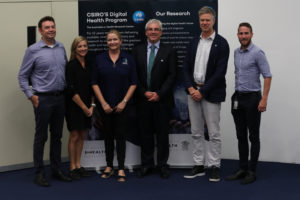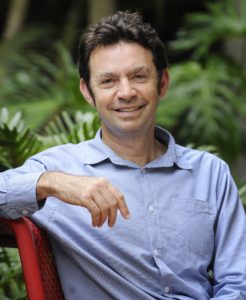NAIDOC Week 2020 – Celebrating some of the unique ways we’re working with our Indigenous communities

The AEHRC and QAIHC staff at the AEHRC Colloquium in March 2020.
This week is a time to celebrate the history, culture and achievements of Aboriginal and Torres Strait Islander peoples. It also presents an opportunity to educate ourselves on key health issues faced by First Nation Australians.
What this means for us at the Australian e-Health Research Centre is having a clear commitment to increasing our contribution to addressing the health disparities between Indigenous and non-Indigenous people in Australia. We are partnering with Aboriginal and Torres Strait Islander Community Controlled Organisations to co-design and co-develop potential e-Health solutions to complement existing successful models of care for some of the most significant health issues in their communities. Below is a snippet of some of the work currently underway.
Managing hypertension with mobile health technology
Queensland Aboriginal and Islander Health Council (QAIHC) is a leadership and policy organisation established in 1990 and is the peak organisation body representing Aboriginal and Torres Strait Islander Community Controlled Health Organisations (ATSICCHO) in Queensland. Self-governance of primary health care for Indigenous people is recognised nationally and internationally as best practice. Community-control allows the local community to determine the priorities, protocols and procedures that are best for their Aboriginal and Torres Strait Islander community.
The use of smartphone and internet technology (mHealth) has shown encouraging results towards care delivery and management of a variety of health conditions from clinician and patient perspectives. However, there are currently no mHealth digital platforms developed for the management of cardiovascular disease specific to the needs of Aboriginal and Torres Strait Islander people and the ATSICCHO sector’s models of care.
A scoping study was undertaken to determine if hypertension m-health is a relevant priority with the ATSICCHO Sector and to provide valuable insights about the needs, preferences and priorities of how Aboriginal and Torres Strait Islander people may wish to engage with m-health for hypertension management. QAIHC and AEHRC are now working with potential ATSICCHO trial sites.
You can read the AEHRC Hypertension Scoping Study 2020 (PDF) here.
Monitoring Residential Thermal Comfort and Smarter Safer Homes Feasibility Trial
Our e-Health research team have been trialling the feasibility and cultural appropriateness of our Smarter Safer Homes (SSH) platform with Indigenous communities. The SSH platform is a remote monitoring system that can support Elders to live on Country independently. Scoping for a feasibility trial in Brisbane with the Winnam Aboriginal and Torres Strait Islander Corporation has been completed and you can read more about it AEHRC At home in Quandamooka Study 2020 (PDF).
The SSH platform is also being used in a unique way to collect evidence to manage thermal comfort to better inform housing sustainability for Aboriginal people living in Town Camps in Alice Springs. This region in Central Australia experiences periods of consecutive days with temperatures over 40 degrees.
The study is being co-designed with Tangentyere Council Aboriginal Corporation to provide evidence of issues experienced by Town Camp members, and this evidence will improve advocacy for the improvement and sustainability of houses. Ray Mahoney and Georgina Hobson from our e-Health team, along with Michael Klerck from Tangentyere Council Aboriginal Corporation presented at the Public Health Association of Australian (PHAA) Virtual Conference last month.
Vanessa Davis, a senior Aboriginal Researcher at the Tangentyere Council Aboriginal Corporation in Alice Springs , has publicly discussed the impact of climate change on the Town Camps and why collaborating with CSIRO is so important: “Town Campers are worried about climate change and its impact on our health and wellbeing….This is our place. If it gets too hot, if we suffer through endless droughts, or we spoil our water then we don’t have another place to go….[We are] working with CSIRO to install data loggers in households. This is to measure the temperatures of houses over 12 months. We want to demonstrate that houses are getting too hot to provide the best health outcomes.”

Dr Ray Mahoney
These are just some of the work we’re involved in to help close the health gap for indigenous Australians. We continue to focus on the cultural appropriateness of digital health solutions for the Aboriginal and Torres Strait Islander communities we’re working with as trials progress.
If you’re keen to hear more about the work we do in this space, contact Dr Ray Mahoney, Senior Research Scientist, Aboriginal and Torres Strait Islander Health at ray.mahoney@csiro.com.
The Australian e-Health Research Centre (AEHRC) is CSIRO's digital health research program and a joint venture between CSIRO and the Queensland Government. The AEHRC works with state and federal health agencies, clinical research groups and health businesses around Australia.
